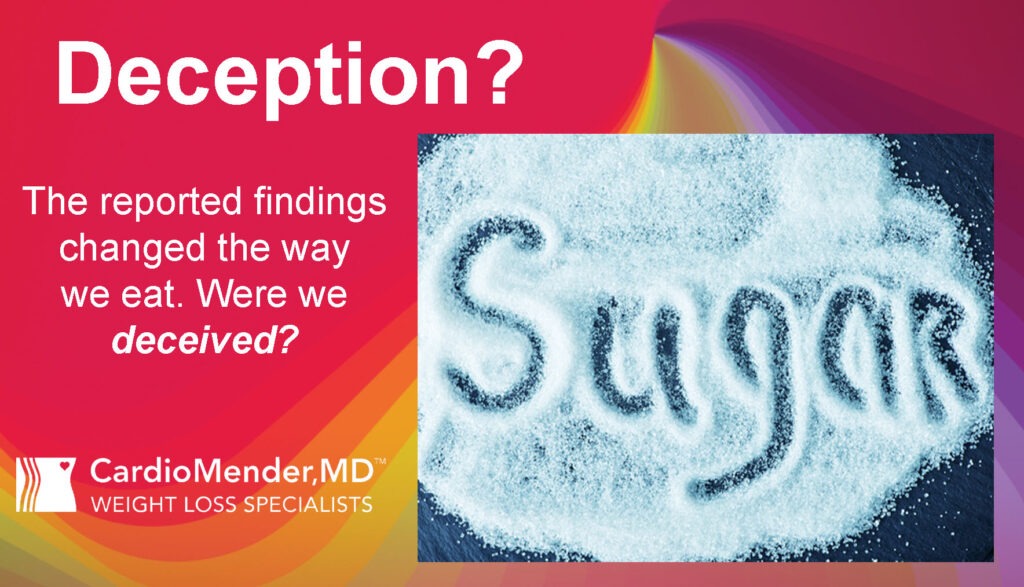Recently, a leading well respected medical journal, JAMA, published an article which revealed evidence that the Sugar Research Foundation paid Harvard Researchers to downplay the association between sugar consumption and coronary artery disease (CAD) while, at the same time, emphasizing that dietary fat was the primary cause.1

Bottom line: This gives the appearance that Harvard researchers were on the take!
The article presents a comprehensive analysis of medical research and forensic evidence showing how the sugar industry implemented a strategy to design and influence medical studies, mislead physicians and seemingly put the public at risk. In my opinion, this tactic resembles that used by the tobacco industry.
Keep in mind that coronary artery disease (CAD) is the #1 cause of death in the US and obesity is the # 1 cause of preventable death, contributing not only to CAD but to Type-2 Diabetes and various types of cancer.
Doctors, as well as the general public, rely on objective, ethical researchers.
The recent article revisits findings in a ‘review article’ published in the New England Journal of Medicine in 19672, one of the most respected journals in the world. ‘Review articles’ are intended to provide an ‘unbiased assessment’ of ALL of the available credible literature on a topic, draw conclusions and make recommendations based on the full complement of objective data.
Physicians typically use review articles as the basis for patient recommendations and treatment. Objectivity is lost when sponsors have the ability to ‘collaborate’ with researchers. Recommendations based on false, incomplete or misleading information can lead to avoidable adverse health consequences for patients and the general public.
The recent JAMA article states that the Harvard researchers received money from the Sugar Research Foundation to produce the 1967 review article on research sponsored in 1965. It also indicates unusual collaboration between the Sugar Foundation and the authors of the article. It states the authors excluded certain data, specifically negative health consequences attributable to diets containing added sugar. The researchers also emphasized other data showing the negative impact of diets rich in saturated fat and cholesterol. In addition, the JAMA article states that the sugar industry influenced the “1976 Food and Drug Administration evaluation of the safety of sugar”3 and goes on to conclude “these findings, our analysis, and current Sugar Associations criticism linking sucrose to cardiovascular disease suggest that the sugar industry may have a long history of influencing federal policy.”

When corporations fund research involving their products and have a vested interest in the outcomes, the results and recommendations should be called into question.
In the case of the sugar industry, their involvement and sponsorship of sugar research was NOT disclosed in the New England Journal review article, 19671, as is standard. This casts further doubt on the integrity of the research they sponsored. There is no way to quantify the full impact that nonobjective research has had on recommendations made by physicians and ultimately on public health.
Bottom line, there is a significant body of evidence that both ‘refined’ sugar and other refined processed foods pose a significant health risk and are contributing to the epidemics of obesity, cardiovasclar disease, Type-2 Diabetes and various forms of cancer.
My recommendations include avoiding foods containing added sugar and as much manufactured refined foods as possible. Limit unhealthy fats and cholesterol. Choose a variety of whole foods similar to those which sustained our ancestors prior to the industrialization of the food industry. Select a variety of fruits, vegetables, healthy protein and foods containing healthy fats such as Omega-3 fatty acids. The outcome of eating in this manner cannot be disputed: it has given each of us and our children the gift of life.

The test of time is the ultimate truth serum.
You’ve Got to Live It!
References:
1. JAMA (Journal of the American Medical Association): Sugar Industry and Coronary Heart Research: A Historic Analysis of Internal Industry Documents. JAMA Internal Medicine, JAMA Network. Online, Special Commucation, September 12, 2016. doi:10.1001/JAMAintemmed.2016.5394.
2. McGandy RB, Hegsted DM, Stare FJ. Dietary fats, carbohydrates and atherosclerotic vascular disease, N Engl J Med. 1967;277(4):186-192, 277(5):245-247.
3. Taubes G, Couzens CK. Big sugar’s sweet little liew: how the industry kept scientists from asking, does sugar kill? 2012, http://www.motherjones.com/environment/2012/10/sugar-industry-lies-campaign Accessed October 17, 2014.






